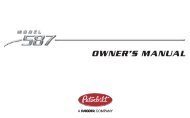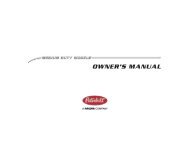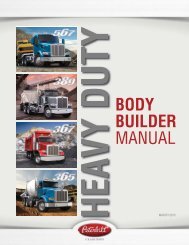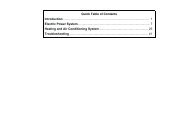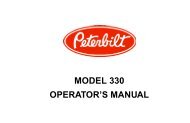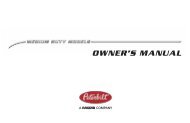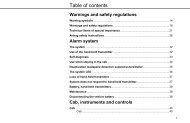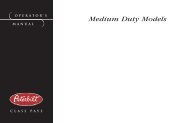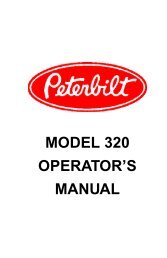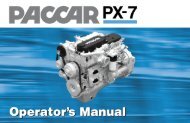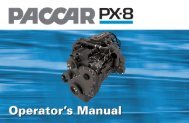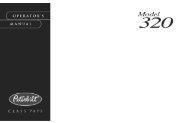Regional Haul Model Operator's Manual - Peterbilt Motors Company
Regional Haul Model Operator's Manual - Peterbilt Motors Company
Regional Haul Model Operator's Manual - Peterbilt Motors Company
Create successful ePaper yourself
Turn your PDF publications into a flip-book with our unique Google optimized e-Paper software.
PREVENTIVE MAINTENANCE<br />
• Do not use moly-disulfide loaded grease or oil (they<br />
may shorten the service life of the slack adjuster).<br />
• Do not use pressure-release grease fittings when<br />
lubricating the slack adjuster.<br />
Checks and Adjustments<br />
All vehicle operators should check the brakes regularly.<br />
Always adjust the brakes when they are cool.<br />
• Park the vehicle on a level surface and block the<br />
wheels before attempting any brake checks or adjustments.<br />
Brake Linings<br />
WARNING! Do not use brake linings with a<br />
thickness below the specified minimum. Such<br />
linings will have lining rivets exposed that can<br />
damage the brake drum and reduce brake efficiency,<br />
which could cause death , personal<br />
injury or system failure.<br />
• Brake linings should be inspected for wear by a qualified<br />
mechanic at an Authorized Service Center. See<br />
Table 2, “Maintenance Schedule,” Page 152. In<br />
severe service applications inspect the linings more<br />
frequently.<br />
BRAKE SYSTEM<br />
Automatic Slack Adjusters<br />
Your <strong>Regional</strong> <strong>Haul</strong> vehicle is equipped with automatic<br />
brake (slack) adjusters.<br />
Periodically, brake adjustment should be checked using<br />
the following procedure:<br />
1. Check brakes when the temperature of the service<br />
brake linings are cool and the system air pressure is<br />
at 100 psi (690 kPa) minimum.<br />
2. Release the parking brakes to allow the slack adjusters<br />
to retract.<br />
3. Measure the retracted pushrod length from the face of<br />
the brake chamber to the center of the pushrod pin.<br />
4. Apply 80 to 90 psi brake application and measure the<br />
same distance.<br />
5. The difference is the pushrod travel distance (applied<br />
stroke).<br />
Verify that the result is within the correct range (see Table<br />
4, ”Brake Adjuster Stroke”). Correctly installed and functioning<br />
brakes (auto slack) will produce the strokes listed<br />
for each chamber type.<br />
<strong>Regional</strong> <strong>Haul</strong> (R05/10) Y53-6033 – 183 –



